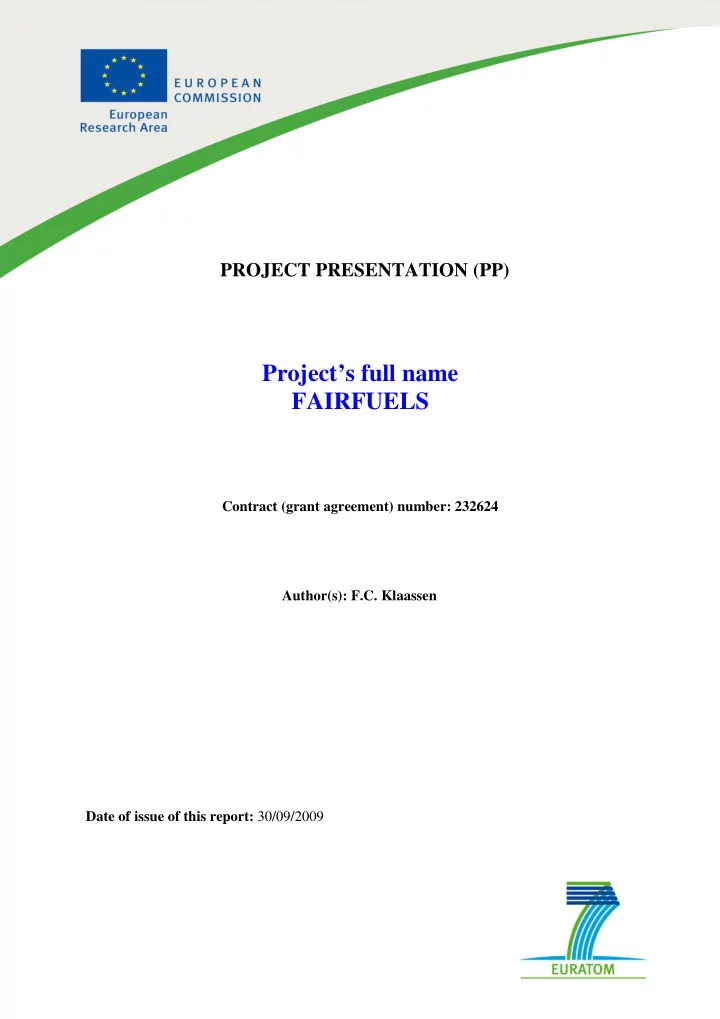

PROJECT PRESENTATION (PP) Project’s full name FAIRFUELS Contract (grant agreement) number: 232624 Author(s): F.C. Klaassen Date of issue of this report: 30/09/2009
Introductory paragraph FAIRFUELS provides a way towards a more efficient use of fissile material in nuclear reac- tors, with a view to reducing the volume and hazard of high level long-lived radioactive waste. By closing the nuclear fuel cycle through increased recycling and transmutation of nu- clear waste, FAIRFUELS contributes to the sustainability of nuclear energy as a carbon-free energy source. 1. Innovative Fuels for sustainable nuclear energy FAIRFUELS focuses on transmutation of minor actinides, since by reducing the minor acti- nide content, the life-time of nuclear waste is significantly reduced. The key challenge in the project is to incorporate the minor actinides, such as americium and curium, in innovative fuel types and to assess the performance of these innovative fuels and targets by experiment and modelling. To reach its ambitious goals, the FAIRFUELS consortium relies on the excellence and exper- tise of its partners, consisting of nuclear research organisations, industry, European Joint Re- search Centres, European universities, and project-management consultancy small and me- dium-sized enterprises (SMEs). 2. From Fabrication via Irradiation to Examination & Modelling Dedicated fuels, containing minor actinides, will be fabricated and an irradiation programme will be carried out in the High Flux Reactor in Petten to address transmutation performance. The fuels and targets are designed for the application of transmutation in future Generation IV nuclear systems. In parallel, FAIRFUELS will conduct Post Irradiation Examination (PIE) of previous irradia- tions to provide in-depth information on their irradiation behaviour. In this way, the results of the irradiation tests, carried out in previous programmes, will be harvested maximally. In sup- port of the PIE, modelling aspects of these fuels will be developed. The focus of the experimental and modelling studies is to understand the behaviour of helium gas, which is formed abundantly during transmutation of minor actinides, and is responsible for most of the irradiation damage. 2
Results and impact 3. FAIRFUELS addresses all aspects of nuclear fuel fabrication and behaviour. Fabrication and characterisation will be undertaken at JRC-ITU in Karlsruhe and in the Atalante facility at CEA. The experience will provide insight towards the optimal fabrication route and best op- tions for incorporating minor actinides into innovative fuels. The irradiation behaviour will be tested in the High Flux Reactor in two dedicated irradiations. The MARIOS irradiation test addresses the mobility of helium, produced during transmuta- tion, at various temperatures. This will allow choosing the optimum irradiation temperature and optimise the design of transmutation fuels for Generation IV reactors. The SPHERE irra- diation test compares innovative fuels in classical pellet-form with SpherePAC. The advan- tage of the latter is their ease of fabrication, thus reducing some of the fabrication challenges. The post irradiation examinations (PIE) of the irradiations, performed in the High Flux Reac- tor and in the Phénix fast reactor, address the behaviour under irradiation of fuels and targets. The results from post irradiation examinations will give answers as to which fuel types are most suitable and how to optimise the design of new types of fuels and targets. The experimental PIE will be complemented with the modelling activities, providing insight in the basic physical and chemical properties of fuels and targets under irradiation. The mod- elling results in return will be validated by the experimental results from the post irradiation examinations. 4. Societal impact The production of nuclear waste is generally considered as the most important drawback of nuclear energy. FAIRFUELS aims at recycling the most problematic and long-lived compo- nents of nuclear waste. In this way, the life-time of nuclear waste can be reduced from over 100,000 years to some thousands of years, or even less. The environmental impact of nuclear waste is thus greatly reduced. The results of FAIRFUELS can be applied both in dedicated nuclear waste burners, such as Accelerator Driven Systems (ADS), or in future Generation IV reactors. These reactor sys- tems form an important link in a fully closed nuclear fuel cycle, with optimum resource utili- sation and minimisation of waste, which is exactly the target of minor actinide transmutation. 5. Sharing the information A training and education programme is implemented to share the knowledge among the community, with a link to other related projects on partitioning and transmutation, such as FP7 ACSEPT and FP7 F-Bridge. Two joint workshops will be organised. In addition the training and education programme focuses on publishing a comprehensive text book on Minor Actinide bearing fuels and targets, to disseminate the knowledge obtained in previous and the current projects to a large audience of students and scientists in the world. 3
Project information Website address: www.fp7-fairfuels.eu Project type (funding instrument): Collaborative Project Project start date: 01/02/2009 Duration: 48 months Total budget: EUR 7,655,144.00 EC contribution: EUR 3,000,000.00 EC project officer (name, address, email): Roberto Passalacqua European Commission Directorate-General for Research Directorate Energy (Euratom) Unit J.2 – Fission CDMA 1/81B-1049 Brussels Email: roberto.passalacqua@ec.europa.eu Coordinator (name, organisation, address, telephone, fax, email): Frodo Klaassen Nuclear Research & consultancy Group (NRG) Westerduinweg 3, P.O. Box 25 1755 ZG PETTEN, the Netherlands Tel. +31 224 564131 Fax: +31 224 568608 Email: klaassen@nrg.eu 4
Partners: Country Partner Partner full name Short name code number 1. Nuclear Research and consultancy Group NRG NL 2. Commissariat à l’Energie Atomique CEA FR 3. Chalmers University of Technology Chalmers SE Centro de Investigaciones Energéticas, Medioam- 4. CIEMAT ES bientales y Tecnologicas 5. Imperial College London Imperial UK Commission of the European Communities – Direc- 6. JRC BE torate general Joint Research Centre 7. Kungliga Tekniska Hoegskolan KTH SE 8. LaGrange sarl LGI FR Studiecentrum voor Kernenergie - Centre d'Etude 9. SCK·CEN BE de l'Energie Nucléaire 10. Serco Ltd. Serco UK 5
Recommend
More recommend